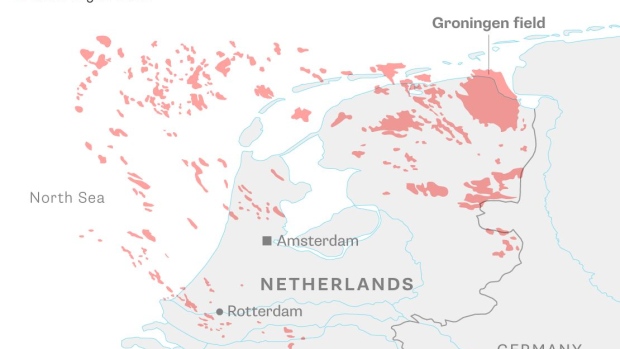Jan 7, 2022
Dutch Plan to Boost Groningen Gas Output Amid Higher Demand
, Bloomberg News

(Bloomberg) -- The Dutch government said it may have to increase natural gas production at the Groningen field this year as the energy crunch in Europe spurs demand.
Germany has said that it needs 1.1 billion cubic meters more gas from Groningen, according to the Dutch government. The request comes on top of a delay in the commissioning of a nitrogen plant in Zuidbroek. That means there is not enough gas to guarantee security of supply from April.
The field’s production may be boosted from 3.9 billion cubic meters to as much as 7.6 billion cubic meters, according to calculations by Dutch grid operator Gasunie. The cabinet will determine before April 1 how much gas will come from the giant field, which is required to be shut down later this year after decades of draining its gas triggered earthquakes.
The plans on increasing output come amid a crunch that has slowed factories in Europe amid a rebound in energy demand. Record-high power and gas prices have crippled European energy suppliers, leaving some running at a loss and causing many to collapse altogether.
The move by the Dutch government paused rallying gas prices after Dutch front-month futures surged over 100 euros a megawatt-hour in early trading as Russia continues to cap flows to the continent. European gas eased toward the end of 2021 but prices still more-than-trebled over the year on the supply fears.
Earlier this week, Stef Blok, the Dutch Minister of Economic and Climate Policy, urged Germany to take all possible measures so that the additional demand is not necessary, according to a letter the minister addressed to the parliament.
Energy Crunch Fuels Most Volatile Year Ever for European Gas
Central to the energy crisis has been a lack of sufficient supply from Russia. Gas flowing to Europe via key pipelines from the country has sunk to the lowest for this time of year since at least 2015, just as temperatures are set to drop.
Groningen’s production plans for this season, which runs from October 2021 to September 2022, will be the last ‘normal’ gas year. The phasing out of gas extraction from the field is still on schedule as the government projects no more gas will be needed from Groningen from mid-2022.
The field has been a key source of gas for much of Western Europe, as well as the backbone of Dutch sovereign finances, since output commenced in 1963. Hundreds of earthquakes of up to 3.6 magnitude have hit the province since 1980s.
(Updates with gas price, more details on energy crunch throughout)
©2022 Bloomberg L.P.


